MANY OF THE BEST camping spots in Australia require you to be totally self sufficient. When this is the case, the degree to which you have organised your supplies generally determines how long you can stay. And, when you've found your little bit of paradise, you want as much time as possible to soak it all in. Our favourite destination is Ningaloo Station, where self-sufficiency is a must and, after years of wringing every last day we can from our supplies, we now have a few tricks up our sleeves. They might notwork for everyone, but if one of them can extend your stay by eveny day, it's priceless.
WATER
Water is the one thing we can't survive long without. If you are planning long, self-sufficient stays, then a big water carrying-capacity is a must. Our Australian Off Road camper has a 140L water tank standard, and we got an extra 83L water tank fitted when we bought it. Two 20L jerry cans at the front of the camper bring our carrying capacity to 277L. It is always wise to carry water in the tow vehicle, and we find that two 10L jerry cans fit down the sides of the drawer system just nicely. They are hard to access, but are for emergencies only.
If you are staying by a beach or creek, use that water whenever possible, it is ideal for things like washing dishes.
If you are swimming every day, you probably don't have to shower every day. A small bowl of water, a flannel and some baby wash are perfect for getting rid of the salt or sunscreen from your skin.Baby wash doesn't have to be rinsed off, saving water. If you are using a porta-potti Biomagic is a chemical specially designed to be used with saltwater.
FOOD
Everybody has different preferences when it comes to food, some are happy to live on tins of baked beans while others expect meat and three veg every night. When we are camping, I'm meant to be having a holiday too, so I'm happy to take a few shortcuts. My philosophy is that camping isn't the time to express your inner Master Chef -it's about quick, nutritious and filling meals.
As we became camper trailers via the oft-travelled path of tent camping, we already had a 60L Engel fitted in the Land Cruiser, and the camper came fitted with a 60L Evakool. We made the decision to run the Evakool as a dedicated freezer, using the Engel as our fridge. This means that if we leave the camper behind on day trips,we still have sandwich fillings and cold drinks in the vehicle with us.
I have about six evening meals that we rotate through when we are travelling, and I take only exactly what I need to make each one.Nothing is worse than packing food at the start of a trip, and unpacking the exact same things at the end because you haven't used them - what a waste of space and weight. Most of the meals have a rice, pasta or cous cous base. When buying pasta, choose the smaller, or more compact shapes like macaroni or spaghetti over the ones that have bigger shapes with a lot of air space like penne or large shells. The packets weigh the same, so you are getting the same amount of food, but the volume of space they take up is significantly different. One more packet could mean another night away!
Though I always use fresh vegetables at home, I find them bulky and hard to keep fresh when travelling. Using the Evakool as a freezer,I now buy bags of frozen, chopped vegetables and use these. They stay fresh and require no preparation apart from cutting open the bag.
Keeping meat fresh is also a concern, and, though I know lots of people who swear by vacuum sealing, it's not always possible to get done on the road when you restock. Freezing meat keeps it fresh,but safely thawing it can be difficult. Personally I cut the meat up (strips for stir fry, chunks for stews and currries) and freeze-it in snap lock bags. Every morning you simply pull the meat for the evening out of the freezer and put it in the fridge, allowing it to defrost safely. If you find you have too much meat in a single bag for this to work effectively, you can cook it from frozen, though it will suffer a slight loss of culinary quality.
Steak and salad dinners generally on happen on the day we do the shopping. Preparing meat like this is a bit more work on shopping day, but it means that in the evenings I can join in on wine-o'clock rather than chop food for dinner.
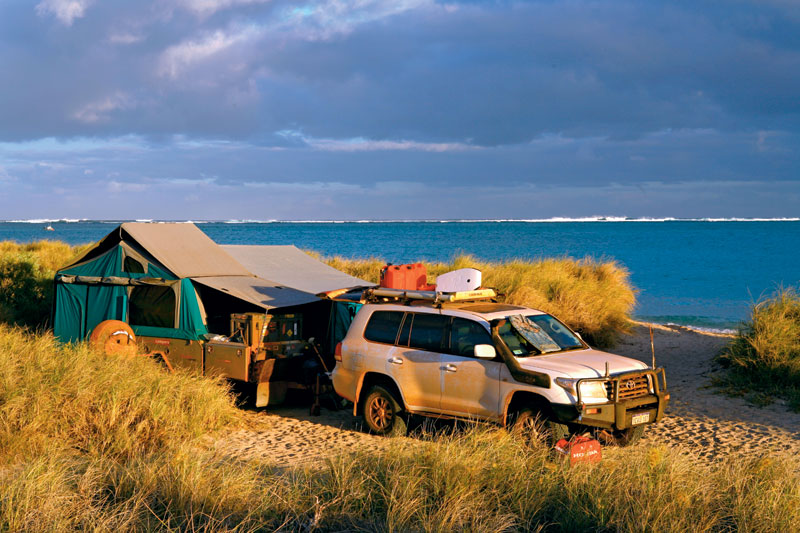


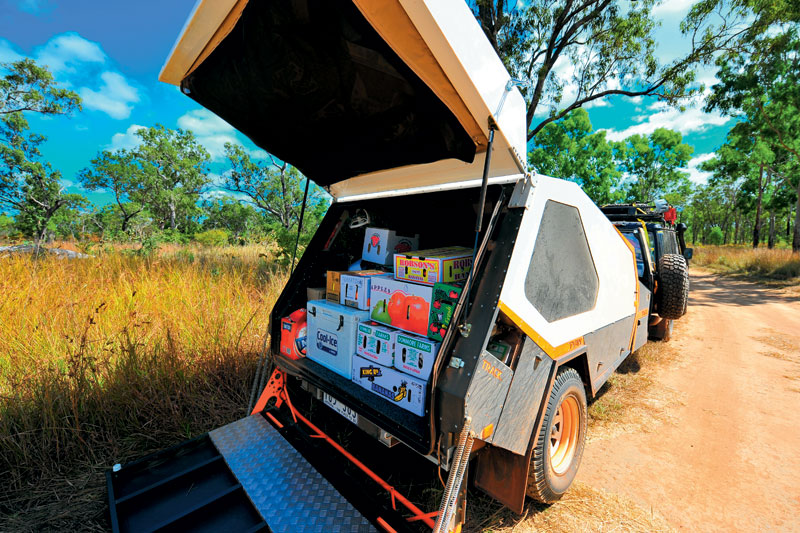
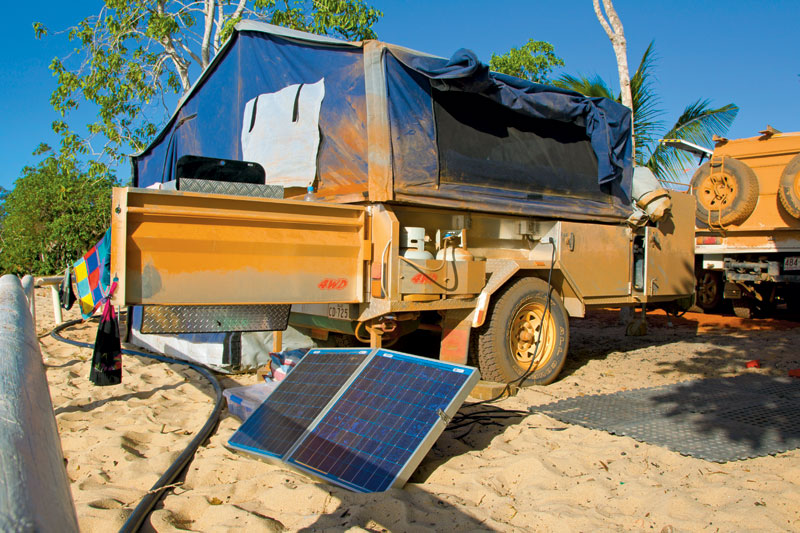
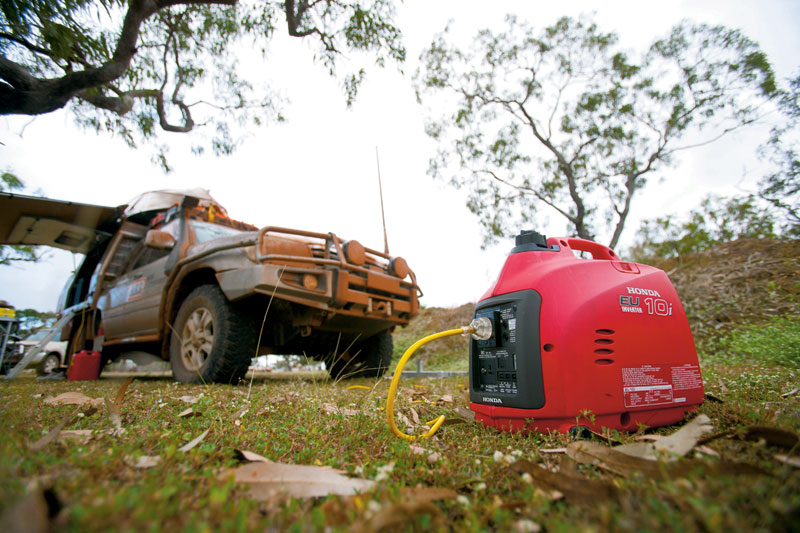
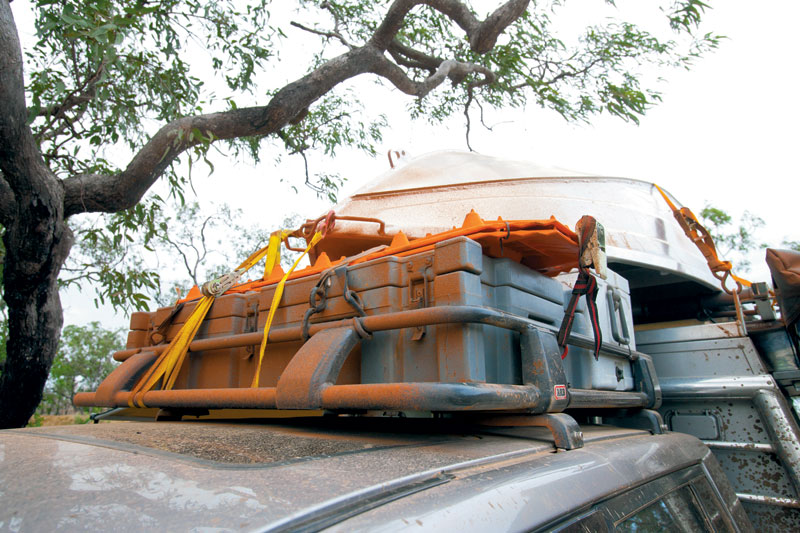
POWER
Keeping both the fridge and freezer running is an ongoing concern.When we are driving, the Anderson plug from the car tops up the batteries. And once set up, there are a few other options. The first thing we do is plug the Engel into the trailer. This way, it is only our two 100Ah deep cycle batteries in the trailer that we need to worry about charging.
When the sun is shining, solar power is great. We run the 130W solar system that came standard with our Odyssey Export Signature camper from Australian Off Road, and this is enough to keep everything sweet. But the sun isn't always shining and that is when a generator comes into its own. We have a little 10i Honda generator which is very quiet to run. In an hour we can top the batteries up enough to see us through another day. So rain, hail or shine, we can keep the power on.
Another benefit of the generator is that it can run our Panasonic bread maker. I used to think that taking a bread maker camping was absolutely ridiculous, but after having fresh bread every day it is on our "must pack" list. A quick bake cycle takes just two hours of running the generator, using very little fuel. Bread is near impossible to keep fresh beyond a couple of days and takes up loads of room. Breadmix flour (pre-weighed into separate snap lock bags)is more compact and can be transported inside the bread maker to save space. Dry flat breads are fine when filled with fresh meat and salads, but who can keep those appetising for weeks? With fresh bread basic spreads like jam or vegemite are fine, and not much can beat a warm slice of fresh bread spread with melting butter enjoyed in an isolated wide open place…
FUEL
A camper that holds two smaller gas bottles rather than one big one is a winner in my mind. When one runs out in the middle of cooking,it's a simple change of connection and you're back in business,with a couple of weeks up your sleeve to get the empty refilled. Much better than an empty gas bottle, a half cooked meal and a hungry family.
TOYS
Space cases are wonderful for increasing storage. They come in all shapes and sizes and are near-indestructible. We have bolted a couple to the wood rack of our camper and use one for bulk storage of food and the other for storing the camp chairs and lighting. One strapped to the roof rack of the Cruiser keeps all the diving and kayaking gear together. They have so far proven to be dust and water proof.
Source: Camper Trailer Australia #47




